Moeena Halim takes a tree walk with Chef Bhairav Singh, the author of a soon-to-be-released book on Ayurvedic recipes, and finds that Mumbai is a treasure trove of medicinal herbs
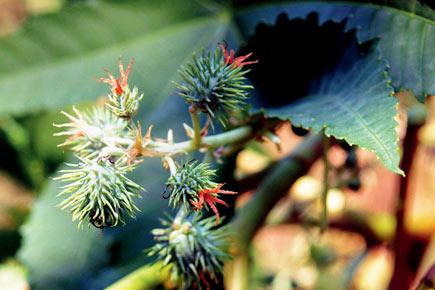
Food, Himalayan Neem, The Erandi tree, castor oil plant, Arjun tree, Chef BhairavSingh, Moongna ki Subzi, Gullar Ki Subzi, Ayurveda
Walking down the lane opposite Dockyard Road station, Chef Bhairav Singh, who heads the Indian kitchens at Novotel Hotel in Mumbai, stops right in front of a non-descript dentist’s clinic in Byculla. He points to a flowering plant, plucks out one of its large green leaves and hands it to me to taste. The deliciously sour leaf, he proclaims, has the ability to keep diabetes in check. “That is why in India it is also called the insulin plant,” he adds. Scientifically known as Costus igneus, the plant with its yellow flowers is not likely to catch your eye and the chef isn’t sure how common it is in the city. “I was pleasantly surprised to spot it one fine day while I was walking to a friend’s bakery down the lane,” reveals the chef.
ADVERTISEMENT
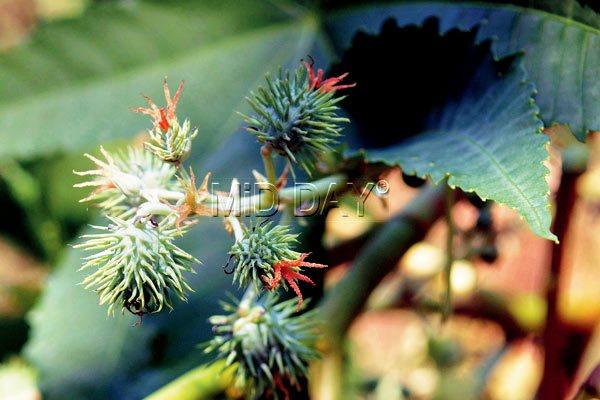
The Erandi tree or castor oil plant. Pics/Sayyed Sameer Abedi
Born in a tiny village near Nathdwara, Rajasthan, Singh grew up learning about Ayurveda from his grandfather, who was the village vaid (physician). In Mumbai now for the past 14 years, his enthusiasm or the alternative healing therapy has only grown. Old habits die hard and the chef still keeps an eye out for plants that might offer a cure for ailments wherever he goes.
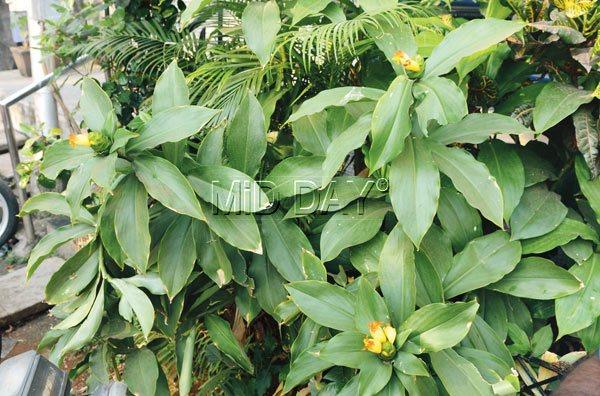
The insulin plant
The tree walk
This is the beginning of our citywide Ayurvedic plant hunt and the streets of Byculla alone are a treasure trove. Pointing to a banyan tree he talks of the many uses of its fruits, leaves and even the roots. “Its red fruit, dried and powdered, can help reduce stammering, while the fresh leaves, ground with mishri (rock sugar), can curejaundice. The fresh root of the banyan can help cure male infertility. I’ve talked about this in my upcoming, untitled book and have also given a recipe on how to use it,” says the 38-yearold, who hopes to gradually introduce Ayurvedic recipes to his menu at Novotel too.
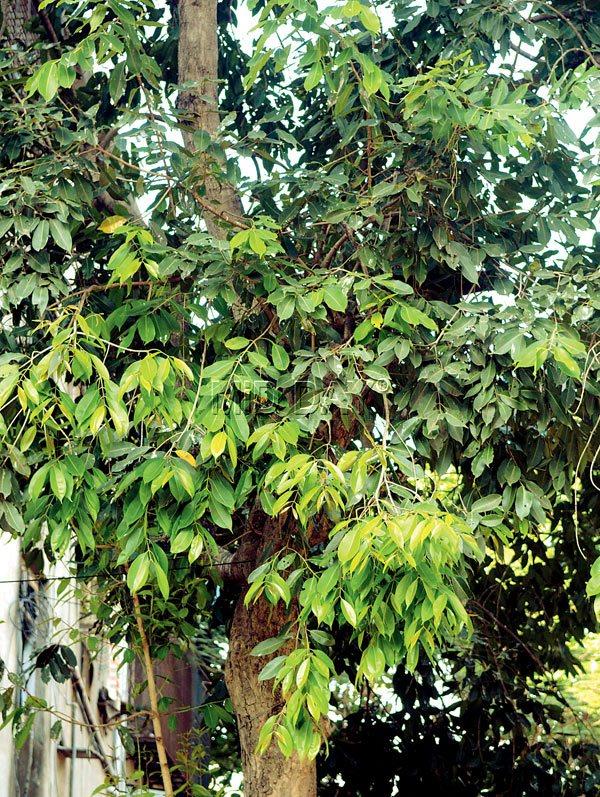
The Jamun plant that can cure as many as 84 diseases
Drumsticks are also wonderful for male fertility, he adds, when he spots a tree just outside Byculla station. “They
are said to increase sperm count. But they’re good for women too, especially for joint pains. Just lightly boil the vegetable or sauté it in coconut oil with curry leaves, jaggery, mustard seeds, imli (tamarind) and methi (fenugreek leaves),” he says. When we pass a jamun tree, he talks of the fruit’s ability to control blood sugar. “Each plant has the ability to cure 84 diseases. I am telling you just one,” he says with a laugh.
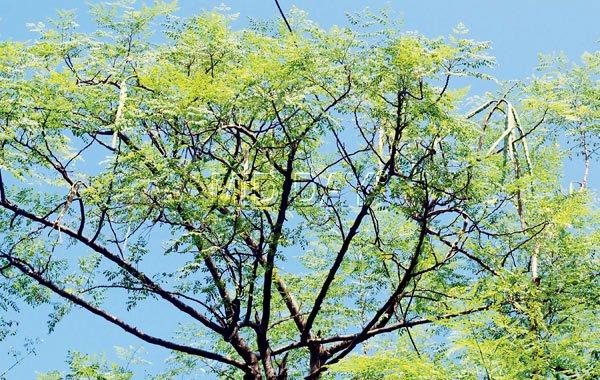
The drumstick tree believed to help tackle male infertility
Our next stop is across the city in Kanjurmarg, where Singh lives. After showing us the rare Himalayan Neem, which helps get rid of boils on the scalp and heals old wounds, he walks us through a shortcut to find the Umbar or Goolar tree, also known as the Cluster Fig tree. “Its leaves help cure pitta – the hyperacidity in your stomach that causes sour belching. Take five fresh leaves, mix them with honey and create a paste. Have this on an empty stomach and you will get instant relief,” says the chef.
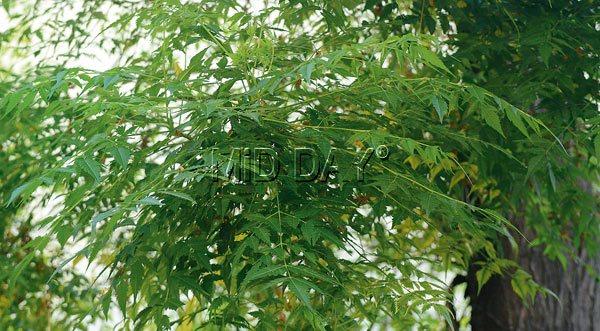
The Himalayan Neem, which helps get rid of boils on the scalp and heals old wounds
As old leaves are often infected by worms, he recommends one should always eat fresh leaves. “It is better to have fresh leaves for a longer duration rather than consume old infected leaves and get another disease,” he adds.

The Gullar tree whose leaves help cure hyperacidity
Leading us to his favourite hangout, a deserted plot of land, taken over by wild shrubs, plants and trees of all kinds, he offers us a taste of the Chirota leaves, also known as the King of Bitters. “The bitter taste is enhanced as you keep chewing it,” he says, watching me scrunch my face in disgust.
“That is why you need to mix them with mishri and milk before you serve them. It’s a wonderful ailment for high fever. Diabetics should have this on any empty stomach,” he explains.
As he hasn’t seen these shrubs anywhere else in the city, Singh plans to take the seeds to grow them at home. “If you can’t find these leaves fresh, you can always dry them and store them. They’d have the same effect,” he adds.
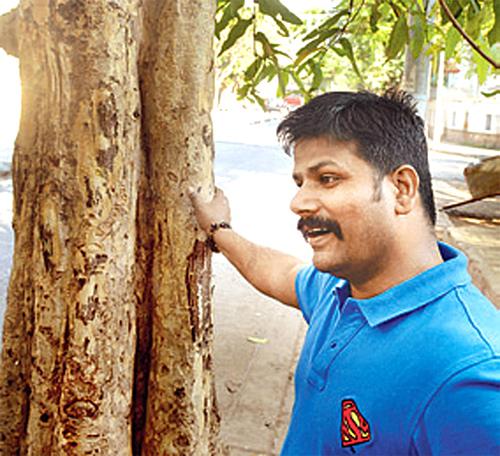
Chef Singh with the Arjun tree, whose bark has medicinal values
Finding Arjun
He also points out the dark crumbly Jaswand flower (hibiscus), found very commonly in Maharashtra, the Erandi (castor oil plant) and the Siris (Albizia) tree. But our journey wouldn’t be complete without a look at the elusive Arjun tree.

“I was thrilled when I spotted one in Juhu,” says the chef, as we drive across to the western suburb. Nestled away in one of Juhu Vile Parle’s many lanes, the tree remains a stranger to most residents. “This is a wonderful tree and has so many benefits. If people realise this, it’s not going to live very long,” rues Singh.
It is the bark of the tree that’s most useful. “Cut about two inches and place it in water overnight. You’ll see thewater turn blood red in the morning. Add a bit of sugar or salt to it and this drink is the best cure for heart disease. Boil the bark in water and this concoction is a wonderful cure for diarrhoea,” reveals the chef.
A few months ago, he spent a week in Patalkot in Madhya Pradesh. The remote village is known for its abundance of Ayurvedic herbs and Singh returned loaded with medicinal booty. “Mumbai has quite a collection of Ayurvedic plants too. We just have to know what to use when,” he signs off
 Subscribe today by clicking the link and stay updated with the latest news!" Click here!
Subscribe today by clicking the link and stay updated with the latest news!" Click here!






